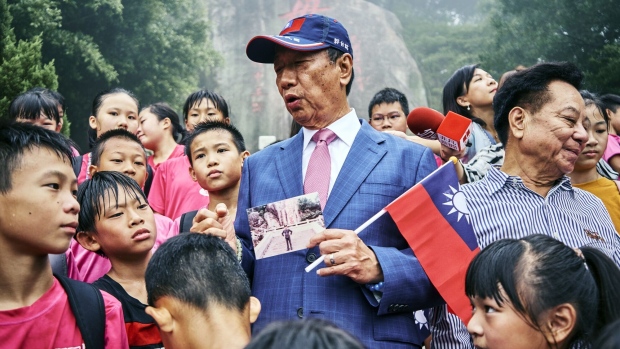Aug 27, 2023
Foxconn Founder to Join Taiwan Presidential Race, Report Says
, Bloomberg News

(Bloomberg) -- Foxconn Technology Group founder Terry Gou ended months of speculation by joining a crowded race to become Taiwan’s next president — in the process upending an election that will have wide-ranging implications for security in the Western Pacific.
Despite trailing the three other candidates in polling, Gou declared his candidacy for the vote in January 2024 at a briefing in Taipei on Monday. For his bid to become official, he will need to secure the signatures of around 290,000 voters.
“Over the past seven years, I’ve witnessed Taiwan go from being prosperous to being on the brink of falling off a cliff in many aspects, including the economy, national defense and foreign affairs,” he said. “If we don’t pull back now, it will be too late to save Taiwan from falling. We have to take down the Democratic Progressive Party.”
Ironically, his entry into the race may make a DPP victory more likely.
Gou’s candidacy puts him in direct competition with the two candidates who support closer ties between Taiwan and China: Hou Yu-ih of the main opposition Kuomintang and Ko Wen-je of the Taiwan People’s Party.
All three are up against Vice President Lai Ching-te, the ruling DPP candidate who champions Taiwan’s status as an independent country.
With Taiwan caught in the middle of an increasingly fractious relationship between the US and China, the outcome of the election will likely determine the direction of ties between Washington, Beijing and Taipei for years to come.
See: Taiwan’s Gou Says Apple Among Reasons China Won’t Pressure Him
Beijing makes no effort to hide its disdain for Lai, signaling it’s likely to keep pressuring the DPP government if he wins the election in January. Lai has in the past described himself as a worker for Taiwan independence. He’s recently toned down that rhetoric, but that hasn’t stopped China from branding him a liar who’s election could compel them to take military action.
Even before Monday’s formal announcement, Gou has made no secret of his desire to be president. Throughout his campaign, he has leaned heavily into his goal of starting peace talks with Beijing, a strategy aimed at winning over voters who hope to eventually see some kind of unification.
But by adding his name to the ballot, he is likely to take votes away from the other candidates who are campaigning on improving relations with Beijing.
“If Gou runs, the rest of us are done for,” Ko said in an interview with Chung T’ien Television earlier this month. “Lai Ching-te would 100% win. We wouldn’t even need to hold the election. Lai could pop the champagne right away.”
The KMT called Gou’s announcement “extremely regrettable” in a statement Monday, reminding the Foxconn founder he had previously promised to back their candidate Hou until the end.
“No matter for what reason, he shouldn’t go back on his repeated promises in black and white,” it said.
The party also warned any of its members they would face disciplinary proceedings if they campaigned on Gou’s behalf.
As things stand, Gou’s pathway to the Presidential Office appears to be limited. Just 15.2% of respondents would vote for him, according to a July poll by Taiwan Public Opinion Foundation, a private think tank. That left him trailing Lai, with a support rating of 33.9%, Ko on 20.5% and Hou’s 18%.
This raises the prospect of opposition contenders joining forces to present a stronger challenge to Lai. While Ko and Hou have ruled out the possibility, Ko said last week he may be open to teaming up with one of the other hopefuls. Gou made similar remarks at Monday’s announcement.
“Out of concern for Taiwan’s geopolitical and economic situation, and strong belief in Taiwan’s democracy, I’ve been attempting to bring all the opposition parties together over the past few months,” he said, noting however that his efforts had made “zero progress” so far because the other candidates have their own considerations.
Gou has tried for the presidency before. In 2019, the tycoon handed over Foxconn’s day-to-day operations to new management to run an ultimately unsuccessful bid.
Gou criticized the DPP in an opinion piece in the Washington Post in July for causing tensions with Beijing, and called for Taiwan and China to resume direct talks under the one-China framework, a reference to the notion that Taiwan is a part of China. The DPP rejects the claim, viewing the island as an already de facto independent nation.
Gou has amassed the bulk of his roughly $7 billion fortune from having his Foxconn make various gadgets for the likes of Apple Inc. and Sony Group Corp. in China since the late 1980s. The majority of Apple’s iconic handsets are still assembled in Foxconn’s main manufacturing hub in central China, a massive campus that’s dubbed “iPhone city.”
--With assistance from Betty Hou.
©2023 Bloomberg L.P.








